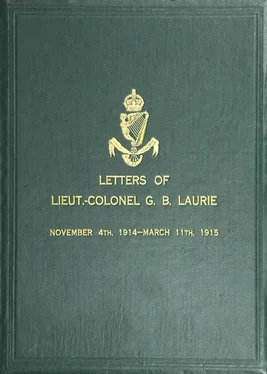George Laurie - Letters of Lt.-Col. George Brenton Laurie
Здесь есть возможность читать онлайн «George Laurie - Letters of Lt.-Col. George Brenton Laurie» весь текст электронной книги совершенно бесплатно (целиком полную версию без сокращений). В некоторых случаях можно слушать аудио, скачать через торрент в формате fb2 и присутствует краткое содержание. Город: Aldershot, Год выпуска: 1921, Издательство: Gale & Polden, Ltd, Жанр: Биографии и Мемуары, prose_military, на английском языке. Описание произведения, (предисловие) а так же отзывы посетителей доступны на портале библиотеки ЛибКат.
- Название:Letters of Lt.-Col. George Brenton Laurie
- Автор:
- Издательство:Gale & Polden, Ltd
- Жанр:
- Год:1921
- Город:Aldershot
- ISBN:нет данных
- Рейтинг книги:5 / 5. Голосов: 1
-
Избранное:Добавить в избранное
- Отзывы:
-
Ваша оценка:
- 100
- 1
- 2
- 3
- 4
- 5
Letters of Lt.-Col. George Brenton Laurie: краткое содержание, описание и аннотация
Предлагаем к чтению аннотацию, описание, краткое содержание или предисловие (зависит от того, что написал сам автор книги «Letters of Lt.-Col. George Brenton Laurie»). Если вы не нашли необходимую информацию о книге — напишите в комментариях, мы постараемся отыскать её.
Letters of Lt.-Col. George Brenton Laurie — читать онлайн бесплатно полную книгу (весь текст) целиком
Ниже представлен текст книги, разбитый по страницам. Система сохранения места последней прочитанной страницы, позволяет с удобством читать онлайн бесплатно книгу «Letters of Lt.-Col. George Brenton Laurie», без необходимости каждый раз заново искать на чём Вы остановились. Поставьте закладку, и сможете в любой момент перейти на страницу, на которой закончили чтение.
Интервал:
Закладка:
Thanks for your letter. I heard from Sir John, and there was one, too, from my Mother, who is a very regular correspondent. Aunt Mary Cowell’s letter turned up also, so I must get letters of thanks written to everyone in due course. To-night I am dining with Gen. Pinney. He and I are supposed to be the two optimists of the Division. Snow on the ground and rather cold. I hope the Germans are very cold and short of food! I am waiting to find out the time of poor Capt. Thompson’s funeral. He was killed when with the General yesterday, as I told you. Sir John Ross is most kind in his remarks, is he not? I thought I had told you that B. and M.’s matches duly arrived. I am sure, in fact, that I did do so. Hal is not too young to ride a pony soon, though Sydney would be; but then you want a man to keep him well on the lead at first. My idea is, as I said before, that when he gets absolutely au fait with his donkey, it would be time enough to put him on a pony. When a boy is over 8 or 9, it is safe to let him ride regularly. Earlier than that, I don’t approve of. I fancy that this Dardanelles business, if properly run, will lead to great results. Personally, I always thought that they had too many troops in Egypt for the sole purpose of defence. Now I suppose they will put some of them up the Dardanelles, and Dame Rumour says that Generals of the Naval Divisions have gone across to the Dardanelles already, but, of course, that may not be true….
Rostrevor House,
Rostrevor, Ireland.
20.2.15.
My dear G——,
Very many congratulations on your being mentioned in despatches, which we are so delighted to see. All the more credit to you that, although you have been out at the front for some time, you were not there at the beginning of the war, and I know in all these cases, when other things are equal, the “mention” goes to those who have been out the longest. I think you know about as much of what is going on as we do, for, on the whole, we are told very little. Yet I am glad to say we are promised two short official accounts every week, and so we must be grateful for that amount of news. The main question outside the actual operations relates to the German intention; if they can torpedo every ship they see, whether it belongs to a belligerent or a neutral! It was always held to be a piece of cruel barbarity to sink a trading vessel without notice, even if belonging to a belligerent nation, the right course being to find out first whether she is a belligerent or not, and then to capture her. It was never considered fair warfare to touch a neutral. But who can say what “Kultur” will bring us to? Most people would call it unblushing piracy and attempted wholesale murder. But we will see what happens. Naval “Kultur” began the day before yesterday, and the report to-day is that a Norwegian neutral was torpedoed. F—— is very well, but does not come here till April. Sydney is here, and is getting fat and chubby, a delightful little boy, and keeps us all very cheery. We have had two delicious days as far as weather is concerned. I hope you have had the same change for the better.
May God keep you safe and sound, dear old G——, is, with our love, our very earnest hope.
I am,
Yours affectionately,
J.R. of B——.
We went to poor Capt. Thompson’s funeral yesterday, Major B. and myself. A military funeral in the field is of three sorts. Well away from the enemy the soldier is borne on a stretcher, sewn up in his blankets and wrapped in a flag. Nearer the enemy you dispense with a flag; and finally, of course, in the trenches, when you cannot get out, you crawl down a ditch and dig a hole in the side and bury the poor fellow. Ours was of the second sort, as it was within long-range rifle fire, but somewhat screened by a hedge. Four officers carried the stretcher, and about six others followed behind. The grave was lined with wheaten straw, unthreshed, and the clergyman read a very short service, and then we all slipped quietly away. After the funeral we trotted on to the 5th Battery. They are friends of ours, and had been heavily shelled the day before; we telephoned them to inquire the result, but had received no answer. The operator, it seems, was obliged to take refuge in a cellar with some women and children, for the enemy positively rained shells upon them, fortunately, however, from a field gun only. Then shells struck the house itself, and the others made holes in the ground round it. Two went through the adjoining windows, two others into the dust-heap, etc. The cause of it was that the French owner had brought a threshing machine and was threshing out his wheat. Of course, the smoke of the engine attracted the Germans at once. The French are very much amused at this, I am told, for they do not allow any such things near their lines; but our Staff are soft-hearted. I had a very pleasant little dinner with Gen. Pinney last night, and played Bridge for an hour—the first game I have had time for since I left the transport at Liverpool. That will give you an idea of how busy I am. When I can, I sleep; otherwise I work hard. We are looking forward to more tartlets. I do not believe in riding lessons at present for H——. Let Sheppard teach him. My father showed me how to hold the reins, and I learnt the remainder myself. Far and away the best way too….
A very cold day with east wind. It will be bitter in the trenches. I hope the Germans are finding it so! I send you a note from some R.I.C. Sergeant in Belfast. Your extract from the Irish Evening Telegraph about me is rather amusing! As to your going to Ireland, it is early yet to decide. Who knows what a day may bring forth at any time? So poor Mr. Gorton has gone. The people in his village will miss him greatly. I will try and put a note in this letter for Patience Gorton, as I know her best, and you can send it on. I always forget the name of their place. By the way, I remember now that it is called Walesby, so will post it direct and save you the trouble. I am glad you thought of sending a wreath. I went for a long ride with the object of seeing someone in the Border Regt. yesterday whom Major Baker knew. Not one officer who came out with that regiment is with it now. This gives you an idea of what is going on here….
Lieutenant-Colonel G.B. Laurie.
Sir,
We write to say how very glad we are to see that you are safe and well. We were delighted to see by the papers that you were among those mentioned for gallantry in the despatch sent home a few days ago by Field-Marshal Sir John French. We have tried to locate the different gentlemen now on active service who had been residing in this district, and the press is our medium—it was there we learnt you were at the front, and we are most anxious, and dearly hope that they all, who were when here so very kind to us, and are now risking their lives that we may be free—may be restored to their homes in perfect health and strength.
This is the spirit which prompts the writing of this letter, and we beg of you not to think us unduly familiar, but rather that we most sincerely hope that you may have perfect health and strength, and, above all, that you may, when the time comes, return home safe and well.
Your obedient servant,
Jeremiah Lee,
Sergt. R.I.C.
I had a hurried ride yesterday in a piercing wind to see my 70 or 80 horses. In the afternoon, just as we were starting off to the trenches, we were stopped and told to wait whilst the Gunners tried to cut the wire in front of the German trenches with shells. Such a course of action may lead to heavy sniping, as you can quite well imagine. However, we got in all right by eight o’clock, and I wandered round my trenches until between 12 and 1 o’clock a.m. This morning we received a notice that we were to be withdrawn to reserve to-morrow or the next day, owing to more troops coming into the line. I had to take the General round who succeeds me in these trenches. He seemed such a nice man. We are supposed to leave to-morrow night if these people can get out from their trenches. The enemy is shelling us now, and as it is a particularly clear day they are using it to the best advantage to try and destroy us. I must turn our guns on to them if they go on like this. I only wish we could swamp the brutes with numbers and get the war over. I am not disturbed about Russia. If we can get the Dardanelles open, we can easily send her ammunition and equipment for her spare men, and so end the war more quickly; but, failing that, I think Russia will easily foil Germany, and spring at her again and again until she is worn out. I had a letter of congratulation from your sister Mabel. Very kind of her….
Читать дальшеИнтервал:
Закладка:
Похожие книги на «Letters of Lt.-Col. George Brenton Laurie»
Представляем Вашему вниманию похожие книги на «Letters of Lt.-Col. George Brenton Laurie» списком для выбора. Мы отобрали схожую по названию и смыслу литературу в надежде предоставить читателям больше вариантов отыскать новые, интересные, ещё непрочитанные произведения.
Обсуждение, отзывы о книге «Letters of Lt.-Col. George Brenton Laurie» и просто собственные мнения читателей. Оставьте ваши комментарии, напишите, что Вы думаете о произведении, его смысле или главных героях. Укажите что конкретно понравилось, а что нет, и почему Вы так считаете.












